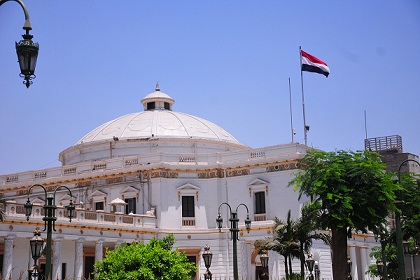
(AFP/EGYPTIAN PRESIDENCY)
President Abdel Fattah Al-Sisi is scheduled to visit Gulf neighbour Saudi Arabia on Sunday to express appreciation to Saudi King Abdullah bin Abdulaziz Al-Saud for his support.
The one-day visit will be Al-Sisi’s first trip to Saudi Arabia, one of Egypt’s strongest backers since the ouster of former president and Muslim Brotherhood politician Mohamed Morsi.
Egyptian Ambassador to Riyadh Afifi Abdel Wahab told state-run Al-Ahram that the visit is “extremely important” for both countries and comes at a sensitive time given the developments and challenges the Arab World is currently facing.
He added that confronting the challenges that pose as a significant risk for the whole region requires more cooperation from the Egyptian and Saudi sides.
Sunday’s will be the second meeting between the president and Saudi monarch since Al-Sisi became president. In June, the president held talks with the Saudi King, 90, when his royal plane landed in the Cairo International Airport for a short, rare stop that lasted a few hours.
They discussed the “Friends of Egypt” conference, which will be organised to provide economic support for Egypt’s struggling economy.
After Al-Sisi’s sweeping victory in the presidential elections on 3 June, the Saudi monarch was quick to congratulate him and called for “a conference for donor brothers and friends of Egypt to help Egypt overcome its economic crisis”. During his inauguration speech on 8 June, Al-Sisi thanked the king for the initiative.
Preparations, involving Egypt, Saudi Arabia and the United Arab Emirates, are currently underway for the conference, set to take place in November this year or in early 2015.
After tensions witnessed during Morsi’s tenure, Egyptian-Saudi ties are becoming increasingly strong, including trade ties. Saudi Arabia was the largest receiver of Egyptian exports during the first five months of 2014 with exports reaching EGP 6.384bn.
Following the forcible dispersal of the pro-Morsi Rabaa Al-Adaweya and Nahda encampments, which left hundreds dead in August 2013, Al-Saud issued a televised speech saying his country stands with Egypt against terrorism.
Days after Morsi’s ouster, the oil-rich monarchy has pledged $5bn in grants, deposits and petroleum products to boost Egypt’s ailing economy. The Saudi aid was divided into $1bn cash, a five-year $2bn interest free deposit at the Central Bank of Egypt and $2bn in the form of petroleum products.
Egypt’s power change in July 2013 has received backing, both verbal and financial, from other Gulf states as well, including the United Arab Emirates and Kuwait, but resulted in a rocky relationship with Qatar, a strong Morsi backer.



